Morocco’s Ministry of Tourism: New Vision for Tourism in Morocco
Yassir Zenagui, Morocco Minister of Tourism
This is something we are working on today and, as a first step, we are aiming to raise more than 10 billion Euros.
Interview with Yassir Zenagui, Morocco Minister of Tourism
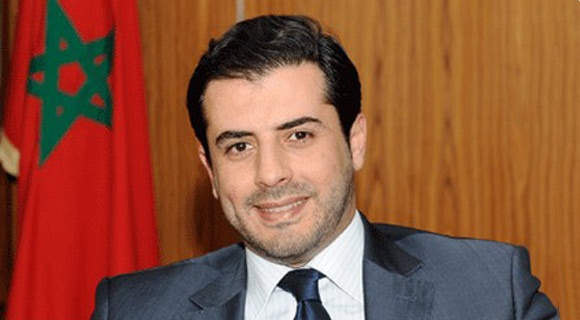
In your opinion, what is the outlook for Morocco’s tourism in 2011 and beyond in view of the regional events – Arab revolutions and what we have seen in Tunisia and Egypt?
What is happening in the region, the geopolitical situation today, will obviously have an impact on the tourism sector in Morocco. How the impact will be, this is the question.
This is something we are working on today and, as a first step, we are aiming to raise more than 10 billion Euros.
We do not believe it will be massive, the impact is there, but we are fortunate this year because we are starting on a very high dynamic in the tourism sector. Things were happening very well before the events started in some countries in the region. We finished last year with an 11-12% progression,which is very high, knowing that the tourism worldwide has not exceeded 6% growth and we started 2011 with very high numbers.
In January, we had a 19% progression on the international tourists. After the events in Egypt in February, we had a 17% progression for the international tourists. March and April will be more difficult because we will start seeing the impact, especially with what is happening in Libya today. So the impact is there, but we are lucky it came at a moment when the progression was very strong. We believe we will still have a progression this year, but it will be less important than the way it started.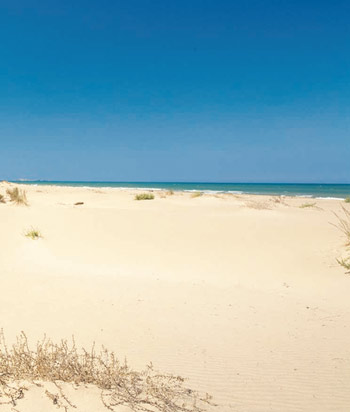
What happened to some countries in the region is the problem of young people not feeling very involved in politics and being part of what happens in the country. I think that Morocco and our King have seen that many years ago and I am the living proof. You have a concrete example in front of you.
I am the Minister of Tourism and my colleague, the Minister of Youth and Sport, is my age. Another colleague who is almost our age is the Minister of Transports and Infrastructure. In addition to that, we have the chance to have a very young, open-minded and dynamic King. This obviously creates a strong dynamic in the country, but it is not enough – we need more youth in the political system and the economic one. We started this trend many years ago and continue to work on it, in order to have a much younger country in the future.
On the other hand, there is a tremendous opportunity because all of these tourists who went to Egypt and Tunisia can come to Morocco, the only stable country in the region. How will you capitalize on this opportunity?
You are right. You are on the field and you see that this is a stable country. We had some protests, but they were peaceful. We are used to having them every day. Protesting in Morocco is allowed and we have in average around 20 protests every day. This is something we have been dealing with for years and democracy has been progressing for many years in the country. Now, how are we going to benefit? This is a tricky situation. Since the events started in some neighbouring countries, we decided not to have an opportunistic approach and take advantage of what is happening there in terms of communication. 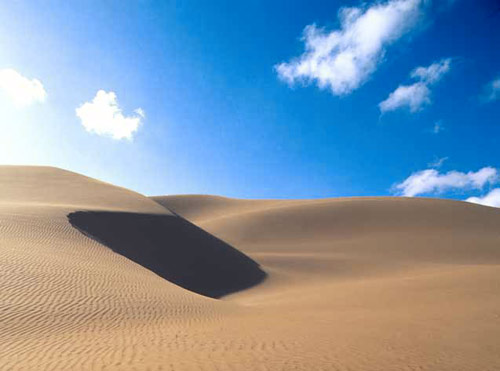
We have not been going out in the media saying that we are better off or that we are more stable just for the sake of respecting our neighbours and their situation. We preferred to keep working as we have being doing for many years now, being serious in building our tourism strategy. The future will show that there is a dynamic happening here that can be seen today as well.
Are we going to catch the tourists? I do not believe so because we have completely different products. 70% of tourism in Morocco is spontaneous – people booking directly via websites or directly with hotel operators. We also have what we call in the industry last minute booking. 30% of the 70% is last minute booking, meaning the last week; the second 30% is the last month.
This is a completely different model than the neighbouring countries’ where they mainly have tour operating tourism and low cost mass tourism. Therefore, today we are not in the position to catch all the flows leaving Tunisia and Egypt. We see them leaving to other destinations like the Canary Islands.
Could you describe the vision for 2020 – origins, implications for tourism in Morocco? What is the general meaning and the historical background for this vision?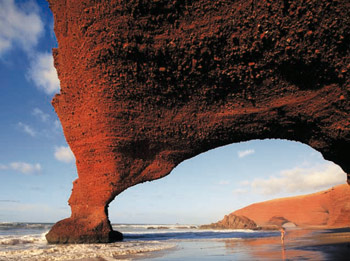
Vision 2020 is the extension of our national tourism strategy that started 10 years ago and at that time was called Vision 2010. Tourism in Morocco had a proactive strategy launched with several structural measures being taken over the past years. It was a very serious and dynamic vision, which allowed us to double the number of tourists – from 4 million in 2004 to roughly 10 million in 2010, to triple the income of the sector, to double the bed capacity in Morocco and to position tourism today as one of the main economy sectors in Morocco representing roughly 10% of its GDP.
It is a robust model, as we could see in 2008-2009, which was the most difficult time during the economic crisis. While we were seeing regression everywhere in the Mediterranean countries – from 2.5% in Tunisia to 10% in Spain, Morocco was the only country that recorded a 6% progression, thus proving that it is a strong and resilient model of betting on the high quality tourism. An average spending for a tourist in Morocco is around 800$, while, for example, in Tunisia it is 250$, and that again confirms what I was saying previously. We are in a different model so we are not in the position to catch flows coming from our neighbouring countries.
Vision 2020 comes to capitalize what has been done during 2010, but also to learn from the mistakes and improve. A new dynamic has been projected and a high ambition – to position Morocco within the best 20 tourism countries in the world. This will be done by tripling the income of the sector, increasing its GDP shares and, last but not least, creating employment. The target is to have more than a million young people working directly in the tourism sector and 4-5 times more than that indirectly. 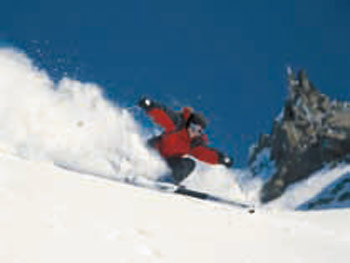
2020 is based on three main principles: The first one is diversity – thanks to the diversity of the country, you could go to the Mediterranean Sea, to the Sahara, to the mountains, you can even ski 45 minutes from Marrakech, enjoy the cedar forests, the dunes, the Atlas Mountains. You have big diversity and proximity, as you can move from one place to another within few hours and completely change the natural environment.
Within two hours you could go from the 4000 m high snowy Atlas Mountains and find yourself in the dunes of the South of Morocco. The second thing is culture and authenticity and this is what will make us strong and different as a destination compared to our neighbour competitors.
The last one is sustainability – it is the heart of the Moroccan strategy environment, the friendly approach to the sector. We have virgin beaches, a lot of virgin forests and we aim to capitalize on that. That, again, is another way of making the destination different from others around the Mediterranean.
This vision also calls for tremendous investments which are in the billions of dollars. Where is the money going to come from?
This is an interesting question. Yes, you can plan and have an ambitious strategy but obviously funds need to be put in place, especially after having gone through a severe economic crisis. The crisis has actually made people’s mentality change, not only their pockets, so we need more innovations, new and original ideas in terms of financial engineering and structure.
Consequently, we have been rigorously working in financial engineering. Everything is quantified, the numbers are there; we have, in every single thing we worked on, projections on 10-20-30 years; we have strong business plans and we are aiming to be very proactive and aggressive in our marketing campaigns to promote investment opportunities in Morocco.
You have big diversity and proximity, as you can move from one place to another within few hours and completely change the natural environment. Within two hours you could go from the 4000 m high snowy Atlas Mountains and find yourself in the dunes of the South of Morocco.
Together with teams and professionals in the sector, I have been participating to investments conferences all over the world. Morocco is going to organize the Hotel Investment Conference in September for the African continent. It is the third one in the world, the first one being in Berlin for Europe and the second one in Dubai for the Middle East.
Casablanca will host the African continent conference. At the same time, we are working on creating new sovereign fund structures for tourism investments. Again, with a new approach using the capital market to increase the size of the debts and not necessarily staying in the classical way of investing, like bringing equity and triggering financing from classic banks, but also using the funding of the country. Morocco was the only country to be upgraded to investment grade last year during the crisis. So we believe that we could also go through the capital markets and attract more financing. The idea of the new structuring, or the sovereign fund, seemed very interesting to a lot of financial investors all over world and we have the most important sovereign funds in the world interested to be our partners – from the Gulf, Asia and Europe. 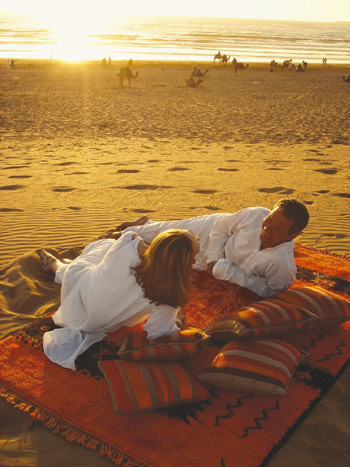
This is something we are working on today and, as a first step, we are aiming to raise more than 10 billion Euros. This is an important amount of money to be invested in addition to spontaneous investment. The aim of this structure is to create partnerships with private investors coming to the country, thus offering security and guarantee of the investment.
When you become partner of the sovereign fund, you are in a much more secure investment environment – you have access to opportunities in terms of land, for instance. We believe this structure will attract more and more spontaneous private investors for partnerships that will supplement the 10 billion Euros in the future.
It sounds very easy, but what are the challenges associated with Vision 2020 and especially its financing?
That is what I have been saying. The financing is there thanks to the product being interesting, which is the most important thing. When you have a good interesting product it is not very difficult to sell it to investors. We have two things here – we have Morocco as a tourism destination with very high potential coming from its location, its natural diversity and the fact that it is two hours away from the main European capitals.
The World Travel Organization is expecting 1.6 billion tourists in 2020. 48% of the world travel market is in Europe, which means that in 2020 we will have 750 million people willing to travel to locations that are less than one or two hours from Morocco.
Today our market share is 1.5-2%. Without being very ambitious, if we target 3% of the 750 million, some very high numbers could be generated from Western Europe alone. Other than that, we have the American market, Eastern Europe, Asia, China, the Arab market, the African market growing today, the South American one. Our first clientele in Amanjena and Mamounia in Marrakech are the Brazilians, representing a massive potential. It shows that there is something there. The ball is in our hands, we just need to strengthen our product to have something big happening here in terms of investment.
The major challenge is that the product is not yet diversified. Another challenge would be to create Mediterranean style tourism in what is traditionally a Muslim country. Are these the challenges that you are worried about?
I disagree with the first one and agree with the second one. I think the product is very much diversified. You can spend the morning in Marrakech swimming in your pool surrounded by palm trees and 45 minutes away from there, you could go to a small skiing station. Then you can take your 4×4 and 2-3 hours away you find yourself in the dunes; then, in 3-4 hours, you are in the Mediterranean sailing. So diversity is there.
There is also cultural diversity. Morocco is a country that has both a Greek and Roman history. The famous fight between Hercules and Antaeus happened in Lixus, Morocco. You have Tangier, which used to be called Tingis, the capital of the Roman Empire. Then there is the Arab Muslim history. This provided the country with a very rich heritage to visit. So I believe there is a strong diversity now. 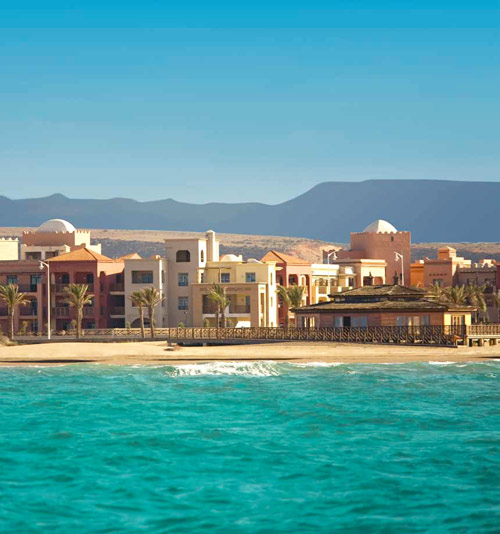
Our weakness is the bed capacity. We need to build more resorts and hotels and not only that. Resorts are not enough to build a strong tourism destination. We also need to build leisure parks, cultural museums and places to visit. This is what will make the destination stronger – entertainment, leisure and offering the tourists an alternative to going to the beach or visiting monuments in the country side.
As for the second part, I believe there is no Muslim model for tourism. A tourist country is an open country. Morocco is open to international tourists who have their own religion, traditions and way of living and whom we invite to come visit us. It is our duty to respect their way of being. I do not think the product needs to be different from any other Mediterranean country, but the opposite. I think we need to create something that responding to their needs and demand. The only way to be a real tourist country is to be an open-minded one, where tolerance is dominating.
Do you offer specific programs to educate youth who will eventually end up working in the tourism industry?
One of the main challenges for the tourism sector and Vision 2020 is the quality of the services. You can build the most beautiful hotels in the world, but if you do not have the appropriate high quality service, it will not be efficient enough. We are aware of that and many years ago we started working on a education program that we are strengthening within the vision.
We are creating tourism territories. Our aim is to have excellence programs and to create at least one excellence institute for the tourism sector in every territory. We have also been working in partnership with one of the main travel institution in the world – we have recently signed a partnership between Glion in Switzerland and the University of Casablanca; Casablanca also has a partnership with l’Ecole hôtelière de Genève; we have also signed a partnership with l’Ecole hôtelière de Lausanne, one of the best in the world.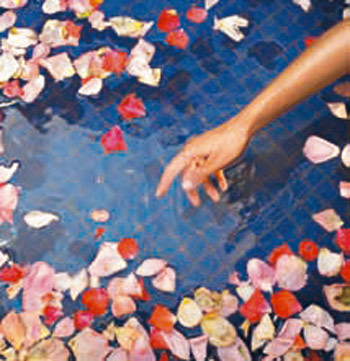
Together with Harvard MIT and the University of Toronto we aim to create the first department of sustainable tourism in the world which will be in the International Institute of Tangier. These are examples of so many concrete actions that have been happening recently, which will of course contribute efficiently to increasing the level of education and therefore the level of services and professionalism in tourism in Morocco.